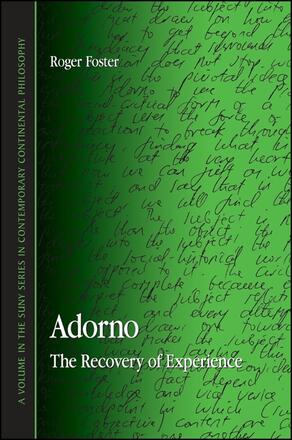
Adorno
The Recovery of Experience
Alternative formats available from:
Examines the role of experience within Adorno’s philosophy of language and epistemology.
Description
In Adorno, Roger Foster argues that there is a coherent critical project at the core of Adorno's philosophy of language and epistemology, the key to which is the recovery of a broader understanding of experience. Foster claims, in Adorno's writings, it is the concept of spiritual experience that denotes this richer vision of experience and signifies an awareness of the experiential conditions of concepts. By elucidating Adorno's view of philosophy as a critical practice that discloses the suffering of the world, Foster shows that Adorno's philosophy does not end up in a form of resignation or futile pessimism. Foster also breaks new ground by placing Adorno's theory of experience in relation to the work of other early twentieth-century thinkers, in particular Henri Bergson, Marcel Proust, Edmund Husserl, and early Wittgenstein.
Roger Foste teaches philosophy at the Borough of Manhattan Community College, the City University of New York.
Reviews
"…this book is exceptional. " — CHOICE
"This book argues its position clearly, engages incisively with the available secondary literature in both English and German, and establishes a new interpretive position that in some ways corrects and in others enhances the scholarly literature. " — Max Pensky, editor of The Actuality of Adorno: Critical Essays on Adorno and the Postmodern
"This is the most lucid presentation I've ever read of Adorno's work. This is a special achievement because Foster is dealing with one of the most difficult and nuanced aspects of Adorno: his conception of experience in relation to language. " — Tom Huhn, editor of The Cambridge Companion to Adorno